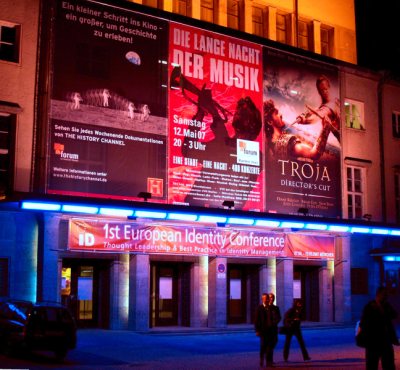I attended Kuppinger Cole and Partner‘s 1st European Identity Conference in Munich, May 7 – 10.
 The trip to the conference was an adventure in itself. It started with ticket confusion and delays for international bag check-in, then long security lines out into the airport parking lot, running to another terminal with shorter lines, sprinting down the concourse only to be told that the paperwork had already been done and I could not board (even though the plane was right there and the door was not shut when I arrived). Sigh. Missed flight. Reschedule. Another missed flight in Atlanta due to lack of an available (airplane) parking place. Reroute through Paris. I’d never been to Paris before. Now I can say that I’ve run through a very nice airport in Paris. About 24 hours after I left home, I got to Munich.
The trip to the conference was an adventure in itself. It started with ticket confusion and delays for international bag check-in, then long security lines out into the airport parking lot, running to another terminal with shorter lines, sprinting down the concourse only to be told that the paperwork had already been done and I could not board (even though the plane was right there and the door was not shut when I arrived). Sigh. Missed flight. Reschedule. Another missed flight in Atlanta due to lack of an available (airplane) parking place. Reroute through Paris. I’d never been to Paris before. Now I can say that I’ve run through a very nice airport in Paris. About 24 hours after I left home, I got to Munich.
At least I learned a new phrase to use when I don’t want to cooperate with someone: “I’m sorry sir, the paperwork has already been completed and there’s nothing I can do.”
I had been trying to arrive in time to hear Dr. Jeff Jaffe’s keynote. I knew part of his presentation would refer to the Bandit project and I wanted to hear both the presentation and the audience reaction. Oddly enough, even though I arrived many hours later than scheduled, the conference was running a little late and I got to hear most of the presentation.
Jeff covered some great concepts about the history of Identity Management products and the role of Open Source. His presentation went very well, and there are photos of it here and here. Since then he has written about the same concepts.

The next day I participated in a panel discussion on Trends in Open Source Identity Management. It was a very lively discussion. Tim Cole did a fine job of moderating before it got too lively. What is not obvious in the photos is that we are in front of large classroom and it’s full of people — standing room only. In the audience were Dick Hardt, Conor Cahill, Bavo De Ridder, and other experts in this area. So the session was also very interactive. At one point, David put a question to the audience, and the panel listened as members of the audience debated. In the end it was very productive. I think numerous valid points were raised, but mostly we found that, while vigorously discussed, there was not as much disagreement as expected. As I remember the main points:
- Open source development has advantages, but we don’t expect identity infrastructure to be exclusively open or exclusively closed source.
- Open standards are essential, and open source development can be very complementary with standards development.
- Numerous protocol families are gaining prominence and have valid uses, but there will not be a single dominant protocol in the near future.
- Open source identity services must plan for clear evolutionary paths from existing systems.
- We have moved out of the realm of debates about theory and possibilities and into debates about user experiences, system capabilities, and operational experiences. Deployments are happening.
Afterward the discussion continued over some fine German beverages.
The conference itself was very informative, and very well run. However, my usual programmer attire is a little underdressed for European gatherings. I’ll work on it.

Munich was beautiful. My hotel was fairly far away from the conference location, so I got to know the subway system. The subways were amazingly bright and colorful. 

